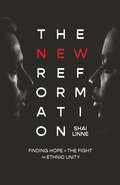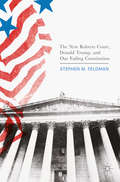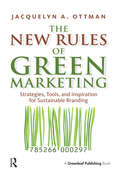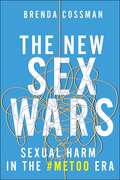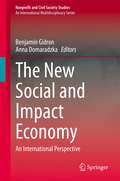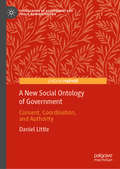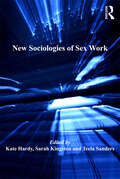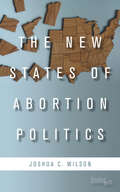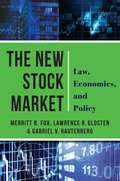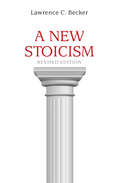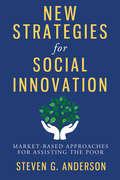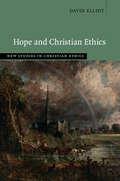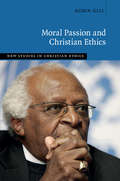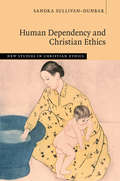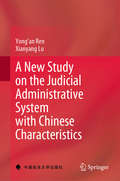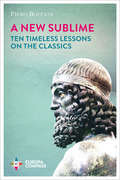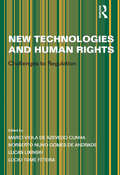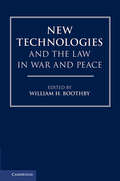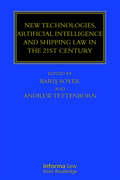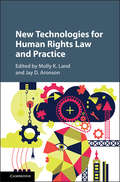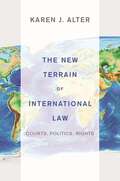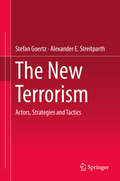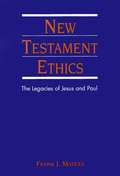- Table View
- List View
The New Reformation: Finding Hope in the Fight for Ethnic Unity
by Shai LinneIn the sixteenth century, the church faced a doctrinal crisis. Today, the crisis is race.We all know that racial unity is important. But what&’s the right way to approach it? How can Christians of different ethnicities pursue unity in an environment that is so highly charged and full of landmines on all sides?In The New Reformation, Christian hip-hop artist Shai Linne shows how the gospel applies to the pursuit of ethnic unity. When it comes to ethnicity, Christians today have to fight against two tendencies: idolatry and apathy. Idolatry makes ethnicity ultimate, while apathy tends to ignore it altogether. But there is a third way, the way of the Bible. Shai explains how ethnicity—the biblical word for what we mean by &“race&”—exists for God&’s glory.Drawing from his experience as an artist-theologian, church planter, and pastor, Shai will help you chart a new way forward in addressing the critical question of what it means for people of all ethnicities to be the one people of God.
The New Reformation: Finding Hope in the Fight for Ethnic Unity
by Shai LinneIn the sixteenth century, the church faced a doctrinal crisis. Today, the crisis is race.We all know that racial unity is important. But what&’s the right way to approach it? How can Christians of different ethnicities pursue unity in an environment that is so highly charged and full of landmines on all sides?In The New Reformation, Christian hip-hop artist Shai Linne shows how the gospel applies to the pursuit of ethnic unity. When it comes to ethnicity, Christians today have to fight against two tendencies: idolatry and apathy. Idolatry makes ethnicity ultimate, while apathy tends to ignore it altogether. But there is a third way, the way of the Bible. Shai explains how ethnicity—the biblical word for what we mean by &“race&”—exists for God&’s glory.Drawing from his experience as an artist-theologian, church planter, and pastor, Shai will help you chart a new way forward in addressing the critical question of what it means for people of all ethnicities to be the one people of God.
The New Roberts Court, Donald Trump, and Our Failing Constitution
by Stephen M. FeldmanThis book examines what Supreme Court Justice Antonin Scalia's death and Judge Neil Gorsuch's appointment means for the future of democracy in America. Before Scalia's death, the five conservative justices of the Roberts Court--John Roberts, Clarence Thomas, Samuel Alito, Anthony Kennedy, and Antonin Scalia--stamped a capitalized version of democracy, discussed in this book as Democracy, Inc. , with a constitutional imprimatur. The justices believed they were upholding the American way of life, but they instead placed our democratic-capitalist system in its gravest danger since World War II. Democracy, Inc. not only contravenes the framers' vision of a system balanced between the public and private spheres, government power and individual rights, but also threatens the very survival of American constitutionalism. With the looming confirmation of Gorsuch, the new Court must choose: will it follow the early Roberts Court in approving and bolstering Democracy, Inc. , or will it restore the crucial balance between the public and private spheres in our democratic-capitalist system?
The New Rules of Green Marketing: Strategies, Tools, and Inspiration for Sustainable Branding
by Jacquelyn OttmanFor too long, marketers of sustainable goods and services have targeted "deep green" consumers to promote their products – and they have little to show for their efforts. In this innovative book, Jacquelyn Ottman shows how the green market has moved beyond such niche marketing, and how marketers will find greater success promoting the inherent superior value of their offerings. Greener products are now available within every industry and are a part of our everyday lives. But they didn't get to be so ubiquitous just because they are better for the planet. Whether they were promoted as such or not, sales of green products have grown so fast because of the added value they provide: health, superior performance, good taste, cost-effectiveness, or simply convenience. This central emphasis on primary benefits – the new rules – is critical to winning over the mainstream consumer and to driving overall organizational growth. The New Rules of Green Marketing helps readers understand why value-based sustainability marketing has become a critical organizational capacity, and how readers can adopt this approach in their own organizations. Illustrated by examples from both international mainstream and the more niche "deep green" leaders who are showing everyone else the way, the book provides practical strategies, tools and inspiration for building every aspect of a credible value-based green marketing strategy, including:How to use a proactive approach to sustainability to spur innovationHow to frame environment-related benefits with relevance to mainstream brandsHow to communicate with credibility and impact – and avoid "greenwashing"How to team up with stakeholders to maximize outreach to consumersHow to use a life cycle orientation to ensure the integrity of one's offeringsHow to best take advantage of recent technological advances in social mediaDrawing on the latest data from leading researchers and reflecting on learnings from Ottman's corporate clients and other pioneers including GE, Nike, HSBC, Method, Starbucks, Timberland, HP, NatureWorks, Philips, Procter & Gamble, Stonyfield Farm and Wal-Mart, this book shows how market leaders are edging out the competition using effective value-first marketing strategies. This book captures the best of the author's previous groundbreaking books on green marketing and takes the content into the 21st century. Whereas earlier works focused on readers who were less familiar with green initiatives, this work squarely focuses on a new generation of marketers who likely themselves grew up with an appreciation of sustainability and who want and need to know how to connect effectively with mainstream consumers.
The New Sex Wars: Sexual Harm in the #MeToo Era
by Brenda CossmanRevisits the sex wars of the 1970s and ’80s and examines their influence on how we think about sexual harm in the #MeToo era#MeToo’s stunning explosion on social media in October 2017 radically changed—and amplified—conversations about sexual violence as it revealed how widespread the issue is and toppled prominent celebrities and politicians. But, as the movement spread, a conflict emerged among feminist supporters and detractors about how punishment should be doled out and how justice should be served. The New Sex Wars reveals that these clashes are nothing new. Delving into the contentious debates from the ’70s and ‘80s, Brenda Cossman traces the striking echoes in the feminist divisions of this earlier period. In exploring the history of past conflicts—the resistance to finding common ground, the media’s pleasure in portraying the debates as polarized cat fights, the simplification of viewpoints as pro- and anti-sex—she shows how they have come to shape the #MeToo era. From the ’70s to today, Cossman examines tensions between the need for recognition and protection under the law, and the colossal and ongoing failure of that law to redress historic injustice. By circumventing law altogether, #MeToo has led us to question whether justice can be served outside of the courtroom. Cossman argues for a different way forward—one based on reparative models that focus on shared desired outcomes and the willingness to understand the other side. Thoughtful and compelling, The New Sex Wars explores what can been learned from these stories, what traps we repeatedly fall into, how we have been denied our anger, and where to begin to make law work.
The New Social and Impact Economy: An International Perspective (Nonprofit and Civil Society Studies)
by Benjamin Gidron Anna DomaradzkaThis edited volume discusses the development of the new social and impact economy in ten countries around the globe. The new social and impact economy is an attempt to conceptualize developments after the 2008 economic crisis, which emphasized the pifalls of the Neo-Liberal economic system. In the aftermath of the crisis, new organizational entities evolved, which combined social and business objectives as part of their mission. Using data gathered by two recent international research projects—the ICSEM project and the FAB-MOVE project—the book provides an initial portrait of the forces at play in the evolution of the new social and impact economy, linking those to the past crisis as well as to Covid19 and comparing the emergence of the phenomenon in a varied group of countries. The book begins with an overview of the classical definitions of social economy and proposes a comprehensive concept of new social and impact economy, its characteristics, and sources. Ten country chapters as well as a comparative chapter on international social economy organizations follow. The volume concludes with an overall analysis of the data from the country chapters, forming a typology of social economy traditions and linking it to recent Post Capitalism trends. Creating a conceptual framework to analyze the new phenomena in social economy, this volume is ideal for academics and practitioners in the fields of social economy; social, economic and welfare policies; social and business entrepreneurship in a comparative fashion; social and technological innovation as well as CSR specialists and practitioners.
A New Social Ontology of Government: Consent, Coordination, and Authority (Foundations of Government and Public Administration)
by Daniel LittleThis book provides a better understanding of some of the central puzzles of empirical political science: how does “government” express will and purpose? How do political institutions come to have effective causal powers in the administration of policy and regulation? What accounts for both plasticity and perseverance of political institutions and practices? And how are we to formulate a better understanding of the persistence of dysfunctions in government and public administration – failures to achieve public goods, the persistence of self-dealing behavior by the actors of the state, and the apparent ubiquity of corruption even within otherwise high-functioning governments?
New Sociologies of Sex Work
by Kate Hardy Sarah KingstonSex work studies have seen an expansion in publications over the past decade, drawing together disciplines from across the social sciences, namely sociology, criminology and social policy. There has, however, been a tendency for research and writing to focus on the more obvious aspect of the sex industry - the visible elements of female street prostitution and those features which attract media attention such as the criminalised aspects of the sex trade. The sex industry is diverse in terms of its organisation, presentation, participants and how it is located in the broader context of globalisation and regulation; there is a need for publications which demonstrate this breadth. This book makes an outstanding contribution to the sociology of sex work through advancing theoretical, policy, methodological and empirical ideas as each chapter pushes the boundaries of a specific area by offering new and critical research as well as commentary.
The New States of Abortion Politics
by Joshua WilsonThe 2014 Supreme Court ruling on McCullen v. Coakley striking down a Massachusetts law regulating anti-abortion activism marked the reengagement of the Supreme Court in abortion politics. A throwback to the days of clinic-front protests, the decision seemed a means to reinvigorate the old street politics of abortion. The Court's ruling also highlights the success of a decades' long effort by anti-abortion activists to transform the very politics of abortion. The New States of Abortion Politics, written by leading scholar Joshua C. Wilson, tells the story of this movement, from streets to legislative halls to courtrooms. With the end of clinic-front activism, lawyers and politicians took on the fight. Anti-abortion activists moved away from a doomed frontal assault on Roe v. Wade and adopted an incremental strategy--putting anti-abortion causes on the offensive in friendly state forums and placing reproductive rights advocates on the defense in the courts. The Supreme Court ruling on Whole Woman's Health v. Hellerstedt in 2016 makes the stakes for abortion politics higher than ever. This book elucidates how--and why.
The New Stock Market: Law, Economics, and Policy
by Merritt B. Fox Lawrence Glosten Gabriel RauterbergThe U.S. stock market has been transformed over the last twenty-five years. Once a market in which human beings traded at human speeds, it is now an electronic market pervaded by algorithmic trading, conducted at speeds nearing that of light. High-frequency traders participate in a large portion of all transactions, and a significant minority of all trade occurs on alternative trading systems known as “dark pools.” These developments have been widely criticized, but there is no consensus on the best regulatory response to these dramatic changes.The New Stock Market offers a comprehensive new look at how these markets work, how they fail, and how they should be regulated. Merritt B. Fox, Lawrence R. Glosten, and Gabriel V. Rauterberg describe stock markets’ institutions and regulatory architecture. They draw on the informational paradigm of microstructure economics to highlight the crucial role of information asymmetries and adverse selection in explaining market behavior, while examining a wide variety of developments in market practices and participants. The result is a compelling account of the stock market’s regulatory framework, fundamental institutions, and economic dynamics, combined with an assessment of its various controversies. The New Stock Market covers a wide range of issues including the practices of high-frequency traders, insider trading, manipulation, short selling, broker-dealer practices, and trading venue fees and rebates. The book illuminates both the existing regulatory structure of our equity trading markets and how we can improve it.
A New Stoicism
by Lawrence C. BeckerWhat would stoic ethics be like today if stoicism had survived as a systematic approach to ethical theory, if it had coped successfully with the challenges of modern philosophy and experimental science? A New Stoicism proposes an answer to that question, offered from within the stoic tradition but without the metaphysical and psychological assumptions that modern philosophy and science have abandoned. Lawrence Becker argues that a secular version of the stoic ethical project, based on contemporary cosmology and developmental psychology, provides the basis for a sophisticated form of ethical naturalism, in which virtually all the hard doctrines of the ancient Stoics can be clearly restated and defended. Becker argues, in keeping with the ancients, that virtue is one thing, not many; that it, and not happiness, is the proper end of all activity; that it alone is good, all other things being merely rank-ordered relative to each other for the sake of the good; and that virtue is sufficient for happiness. Moreover, he rejects the popular caricature of the stoic as a grave figure, emotionally detached and capable mainly of endurance, resignation, and coping with pain. To the contrary, he holds that while stoic sages are able to endure the extremes of human suffering, they do not have to sacrifice joy to have that ability, and he seeks to turn our attention from the familiar, therapeutic part of stoic moral training to a reconsideration of its theoretical foundations.
New Strategies for Social Innovation: Market-Based Approaches for Assisting the Poor
by Anderson Steven G.This book is the first to assess emerging market-based social change approaches comparatively, focusing specifically on social entrepreneurship, corporate social responsibility, fair trade, and private sustainable development
New Studies in Christian Ethics: Hope and Christian Ethics (New Studies in Christian Ethics)
by David ElliotThe theological virtue of hope has long been neglected in Christian ethics. However, as social, civic and global anxieties mount, the need to overcome despair has become urgent. This book proposes the theological virtue of hope as a promising source of rejuvenation. Theological hope sustains us from the sloth, presumption and despair that threaten amid injustice, tragedy and dying; it provides an ultimate meaning and transcendent purpose to our lives; and it rejoices and refreshes us 'on the way' with the prospect of eternal beatitude. Rather than degrading this life and world, hope ordains earthly goods to our eschatological end, forming us to pursue social justice with a resilience and vitality that transcend the cynicism and disillusionment so widespread at present. Drawing on Thomas Aquinas and virtue ethics, the book shows how the virtue of hope contributes to human happiness in this life and not just the next.
New Studies in Christian Ethics: Moral Passion and Christian Ethics
by Robin GillIn this book, Robin Gill argues that moral passion and rational ethical deliberation are not enemies, and that moral passion often lurks behind many apparently rational ethical commitments. He also contends that though moral passion is a key component of truly selfless moral action, without rational ethical deliberation it can also be extremely dangerous. Gill maintains that a reanalysis of moral passion is overdue. He inspects the gap between the 'purely rational' accounts of ethics provided by some moral philosophers and the normative positions that they espouse and/or the moral actions that they pursue. He also contends that Christian ethicists have not been adept at identifying their own implicit moral passion or at explaining why it is that doctrinal positions generate passionately held moral conclusions. Using a range of disciplines, including cognitive science and moral psychology, alongside the more usual disciplines of moral philosophy and religious ethics, Gill also makes links with moral passion in other world faith traditions.
New Studies in Christian Ethics: Human Dependency and Christian Ethics (New Studies in Christian Ethics)
by Sullivan-Dunbar SandraDependency is a central aspect of human existence, as are dependent care relations: relations between caregivers and young children, persons with disabilities, or frail elderly persons. In this book, Sandra Sullivan-Dunbar argues that many prominent interpretations of Christian love either obscure dependency and care, or fail to adequately address injustice in the global social organization of care. Sullivan-Dunbar engages a wide-ranging interdisciplinary conversation between Christian ethics and economics, political theory, and care scholarship, drawing on the rich body of recent feminist work reintegrating dependency and care into the economic, political, and moral spheres. She identifies essential elements of a Christian ethic of love and justice for dependent care relations in a globalized care economy. She also suggests resources for such an ethic ranging from Catholic social thought, feminist political ethics of care, disability and vulnerability studies, and Christian theological accounts of the divine-human relation.
New Studies in European History: West Germany, Cold War Europe and the Algerian War
by Von Bülow MathildeAn illuminating and provocative account of Germany's role as sanctuary for Algerian nationalists during their fight for independence from France between 1954 and 1962. The book explores key issues such as the impact of external sanctuaries on French counterinsurgency efforts; the part played by security and intelligence services in efforts to eliminate these sanctuaries; the Algerian War's influence on West German foreign and security policy; and finally, the emergence of West German civic engagement in support of Algeria's independence struggle, which served to shape the newly independent country's perception of its role and place in international society. Mathilde von Bulow sheds new light on the impact of FLN activities, the role of anti-colonial movements and insurgencies in the developing world in shaping the dynamics of the Cold War as well as the manner in which the Algerian War was fought and won.
A New Study on the Judicial Administrative System with Chinese Characteristics
by Yong'an Ren Xianyang LuThis book offers a comprehensive introduction to China’s judicial administration system. It presents in-depth analyses of the country’s current judicial administration system, as well as a new theory on the system that is based on the realities of today’s China, and provides guidance on reform. The book examines the system as a whole, as well as various specific aspects of judicial administration, putting forward bold theoretical proposals for improving China’s judicial administration system and judicial system in general.
A New Sublime: Ten Timeless Lessons on the Classics
by Piero BoitaniIn a book &“as bewitching and entertaining as a novel&” a renowned Italian literary critic &“uncovers the unexpected, extraordinary modernity of the classics&” (Piero Dorfles). In A New Sublime, literary critic Piero Boitani reveals the timeless beauty and wisdom of ancient literature, highlighting its profound and surprising connections to the present. Ranging from Homer to Tacitus, with Thucydides, Aristotle, Sophocles, Cicero, and many others in between, Boitani&’s fresh and inspiring insights remind us of the enduring importance and beauty of the classics of the Western canon. Boitani explores what the classics have to say about the mutability and fluidity of identity and matter, the power and position of women in society. He also looks closely at their depictions of force and subjugation, fate and free will, the ethical life, hospitality, love, compassion, and mysticism. Through it all, he shows how the classics can play active roles in our contemporary lives.
New Technologies and Human Rights: Challenges to Regulation
by Norberto Nuno Andrade Lúcio Tomé FéteiraWhilst advances in biotechnology and information technology have undoubtedly resulted in better quality of life for mankind, they can also bring about global problems. The legal response to the challenges caused by the rapid progress of technological change has been slow and the question of how international human rights should be protected and promoted with respect to science and technology remains unexplored. The contributors to this book explore the political discourse and power relations of technological growth and human rights issues between the Global South and the Global North and uncover the different perspectives of both regions. They investigate the conflict between technology and human rights and the perpetuation of inequality and subjection of the South to the North. With emerging economies such as Brazil playing a major role in trade, investment and financial law, the book examines how human rights are affected in Southern countries and identifies significant challenges to reform in the areas of international law and policy.
New Technologies and the Law in War and Peace
by William H. BoothbyPolicymakers, legislators, scientists, thinkers, military strategists, academics, and all those interested in understanding the future want to know how twenty-first century scientific advance should be regulated in war and peace. This book tries to provide some of the answers. Part I summarises some important elements of the relevant law. In Part II, individual chapters are devoted to cyber capabilities, highly automated and autonomous systems, human enhancement technologies, human degradation techniques, the regulation of nanomaterials, novel naval technologies, outer space, synthetic brain technologies beyond artificial intelligence, and biometrics. The final part of the book notes important synergies that emerge between the different technologies and legal provisions, existing and proposed, assesses notions of convergence and of composition in international law, and provides some concluding remarks. The new technologies, their uses, and their regulation in war and peace are presented to the reader who is invited to draw conclusions.
New Technologies, Artificial Intelligence and Shipping Law in the 21st Century (Maritime and Transport Law Library)
by Bar 305 351 Professor Soyer Andrew TettenbornNew Technologies, Artificial Intelligence and Shipping Law in the 21st Century consists of edited versions of the papers delivered at the Institute of International Shipping and Trade Law’s 14th International Colloquium at Swansea Law School in September 2018. Written by a combination of top academics and highly experienced legal practitioners, these papers have been carefully co-ordinated to give the reader a first-class insight into the issues surrounding new technology and shipping. The book is set out in three parts: Part I offers a detailed and critical analysis of issues that are emerging, and those that are likely to emerge, from the use of advanced computer technology, particularly at the contracting process and in the context of issuing trading documents. Part 2 focusses on artificial intelligence and discusses the contemporary issues that will emerge once autonomous ships and similar crafts are put to use in the world’s oceans. As well as this, the legal impact of ports utilising artificial intelligence and computer technology will also be considered. Part 3 analyses how the increasing use of legal technology is changing insurance underwriting and shipping litigation. An invaluable guide to the recent technological advances in shipping, this book is vital reading for both professional and academic readers.
New Technologies for Human Rights Law and Practice
by Jay D. Aronson Molly K. LandNew technological innovations offer significant opportunities to promote and protect human rights. At the same time, they also pose undeniable risks. In some areas, they may even be changing what we mean by human rights. The fact that new technologies are often privately controlled raises further questions about accountability and transparency and the role of human rights in regulating these actors. This volume – edited by Molly K. Land and Jay D. Aronson – provides an essential roadmap for understanding the relationship between technology and human rights law and practice. It offers cutting-edge analysis and practical strategies in contexts as diverse as autonomous lethal weapons, climate change technology, the Internet and social media, and water meters. This title is also available as Open Access.
The New Terrain of International Law: Courts, Politics, Rights
by Karen J. AlterA compelling new look at the role of today's international courtsIn 1989, when the Cold War ended, there were six permanent international courts. Today there are more than two dozen that have collectively issued over thirty-seven thousand binding legal rulings. The New Terrain of International Law charts the developments and trends in the creation and role of international courts, and explains how the delegation of authority to international judicial institutions influences global and domestic politics.The New Terrain of International Law presents an in-depth look at the scope and powers of international courts operating around the world. Focusing on dispute resolution, enforcement, administrative review, and constitutional review, Karen Alter argues that international courts alter politics by providing legal, symbolic, and leverage resources that shift the political balance in favor of domestic and international actors who prefer policies more consistent with international law objectives. International courts name violations of the law and perhaps specify remedies. Alter explains how this limited power--the power to speak the law--translates into political influence, and she considers eighteen case studies, showing how international courts change state behavior. The case studies, spanning issue areas and regions of the world, collectively elucidate the political factors that often intervene to limit whether or not international courts are invoked and whether international judges dare to demand significant changes in state practices.
The New Terrorism: Actors, Strategies and Tactics
by Stefan Goertz Alexander E. StreitparthIn light of asymmetrical security threats in western democracies as well as in conflict regions, this timely book examines the actors, strategies and tactics of Islamist terrorism and transnational organized crime around the globe. The authors develop an interdisciplinary approach to understanding the ideologies, forms of cooperation, and technological means used in new forms of terrorism. The book starts with an empirical analysis of the new Jihadism as a global Islamist theology and strategy. Furthermore, it investigates the interaction, cooperation and fusion of transnational organized crime and Islamist terrorism and highlights new communication technologies as vital tools for terrorism. Lastly, the book provides an analysis of asymmetrical strategies and tactics used by terrorist organisations, and of low-level terrorism. As such, it will appeal to all political scientists and criminologists studying terrorism, as well as to professionals at various national and international security services.
New Testament Ethics: The Legacies Of Jesus And Paul
by Frank J. MateraNeither Jesus nor Paul developed a formal ethical system, yet each left a moral legacy that forms the core of New Testament ethics. In this book, Frank Matera examines the ethic found in the teachings of Jesus and Paul. He explores the broad range of moral concerns found in these writings and finds an identifiable unity that underlies the ethical teachings of both.
